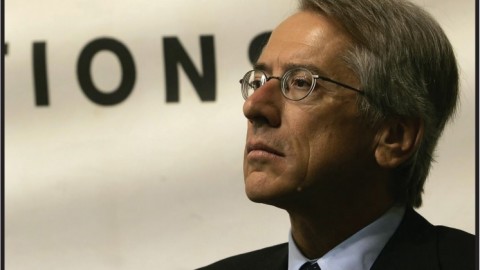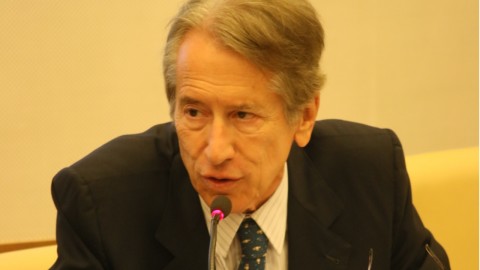Geneva, 10th March 2018
Mr. Mayor Remy Pagani, authorities, dear Friends,
I would like to express also on behalf of the Global Committe for the Rule of Law – Marco Pannella and on behalf of the Non Violent Radical Party Transnational and Transparty, my deepest appreciation for inviting us today. My sincere thanks to Professor Ngodup Dorjee, Representative of His Holiness for Southern Europe to Dawa Tsultrim and to the President of Italy- Tibet Association, Claudio Cardelli.
It is an honour indeed to address this very distinguished audience, to bear witness to the fact that the universal values, example, and teaching of His Holiness the Dalai Lama are deeply admired in Italy as in every part of Europe. They especially inspire all those who belong to the non violent Radical movement and the organizations engaged in keeping preciously intact and very much alive the legacy of Marco Pannella. To the Global Committe for the Rule of Law, that he founded a short while before leaving us, human dignity, freedom, right to know, justice are the cardinal directions for its mission.
Marco was always led by a profound attachment and admiration for His Holiness. And I think that he felt rewarded by the special attentions reserved to him by the Dalai Lama. When he was invited on 21 June 2015 to Dharamsala to celebrate His Holiness 80th birthday, Pannella praised the call for autonomy for Tibet advanced by the Dalai Lama years before and shared by the Tibetan Parliament in exile. Pannella said: “this community which gathered here today represents Satyagraha; it is love for the truth and the strength of love, which is needed also to our opponents, starting with the Han people”.
The close understanding and support the Leader of the Non Violent Radical Party was showing for Tibet’s people and traditions was all but new. It was a constant of his political and intellectual life. Six years before attending the celebration in Dharamsala, on 11 March 2009, Pannella had moved a Resolution at the European Parliament, coherent with many other statements and initiatives he reserved to the situation in Tibet.. On that day of March 2009 he expressed a very special wish:
“The Dalai Lama has appealed for non-violence, was awarded the Nobel Peace Prize for his efforts and is not calling for the independence of country-region Tibet but for the resumption of negotiations with the Chinese authorities, so as to reach a comprehensive political agreement on Genuine Autonomy, within the context of the People’s Republic of country-region place China”.
Matteo Angioli, Secretary General of the Global Committee for the Rule of Law, had the opportunity to remind His Holiness, when he did visit Pisa one year ago, Pannella’s legacy and his closest friends determination to continue his mission. This is why the Global Committee is especially honoured to have among its most distinguished members Thubten Wangchen, disciple of His Holiness the Dalai Lama, and a member of the Tibetan Parliament in exile, in Dharamsala. In 2012, Thubten Wangchen, promoted the “Flame of Truth” for Tibet, a campaign to advocate human rights promoted by the Tibetan Central Administration. He monk traveled through the Americas, Europe and Asia with the support and support of all Tibetan communities in the world. When Wangchen and the Flame arrived in Rome, in October 2012 they were welcomed by the Mayor and Marco Pannella.
The enormous value Tibet’s culture and traditions have for human progress, peace, and dialogue among people, is especially evident when we think about freedom of religion and belief. No other field of human rights bears a significance as vast as that specific freedom for the life of individuals and entire nations.
The Global Committe for the Rule of Law, is strongly engaged in that direction together with groups and organization which share similar objectives.
Tibet’s history is a compelling evidence of the universality of human rights, freedom of religion and belief in particular. It is widely recognized how much the teaching and the example of His Holiness the Dalai Lama are shaping the conscience of people of good will, encouraging their inner understanding, spiritual growth, appeal for tolerance and love towards all creatures.
Freedom of religion enshrined in Tibet’s culture precedes and in many ways reinforces the most important acquis that, in my opinion, had ever been rooted in the European Union system of legal norms and political commitment: the promotion and protection of freedom of religion and belief. As a fundamental right of every human being, its free exercise directly contributes to democracy, development, rule of law, peace and stability. Whenever it is violated, intolerance, violence and conflicts spread easily.
Over the background of the increasing intolerance and authoritarian rule which characterize the situation in the world and in Asia in particular, I would like to take the opportunity of today ‘s meeting to launch an appeal to EU Institutions and Governments: they must consider again , and more closely, the precise obligations which the Europeans have in promoting freedom of religion and belief worldwide.
Too many within the EU Government and institutions seem to have forgotten the EU Guidelines on the promotion and protection of freedom of religion or belief established by Foreign Affairs Council in Luxembourg, on 24 June 2013.
And I would like to remind these obligations:
- 33. The promotion of religious tolerance, respect for diversity and mutual understanding are of utmost importance with a view to creating an environment conducive to the full enjoyment by all persons of freedom of religion or belief.
- 34. The EU will: Encourage state and other influential actors, whether religious or non-religious, to refrain from fostering inter-religious tensions, either by law or practice.
Call on states to promote, through the educational system and other means, respect for diversity and mutual understanding by encouraging a wider knowledge of the diversity of religions and beliefs within their jurisdiction.
- 42. The EU will:
- a) Challenge attempts to make the exercise of human rights conditional upon state permission, for example by compulsory registration of religious or belief groups and/or the banning of unregistered religious activity.
- b) Take action when requirements for religious or belief-related organisations to register are used as a means of state control rather than to facilitate the exercise of the freedom of religion or belief.
- c) Encourage States to ensure the protection of religious heritage sites and places of worship, especially when groups of people gathered in these places face threats.
- d) Take action when property used for religious worship is unduly confiscated, or people are otherwise prevented from using it in the way in which it is legitimately intended.
- e) Condemn legislation that provides for discriminatory treatment of persons or groups belonging to different religions and beliefs, as well as the discriminatory application to such persons and groups of nominally neutral legislation.
These and others EU commitments undertaken at the highest editorial level, must be fully implemented by EU Government and institution. The situation in Tibet should not be considered an exception.
 wikipedia
wikipedia
